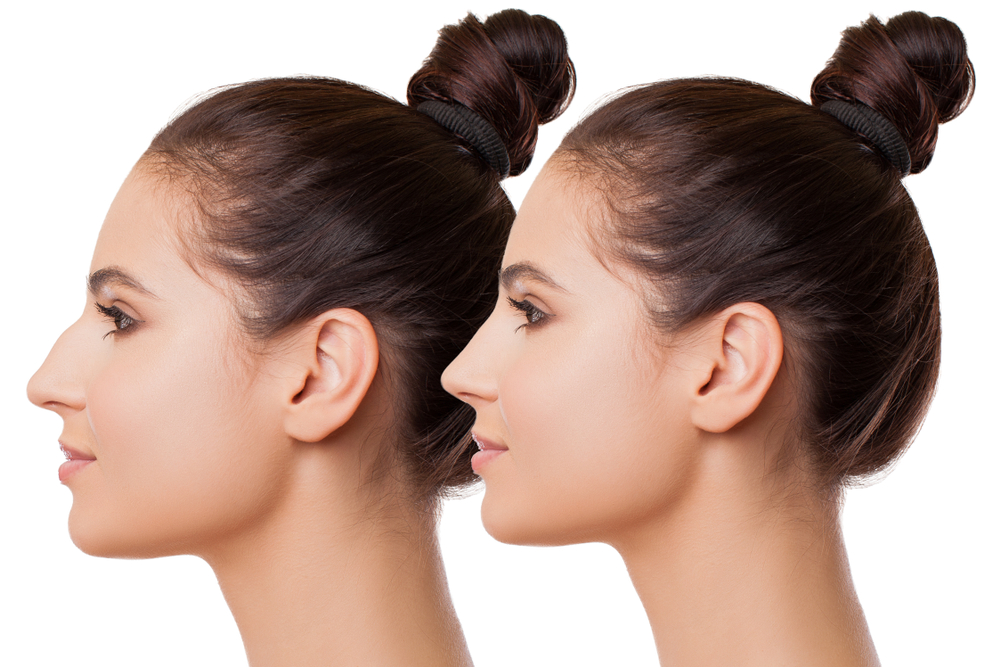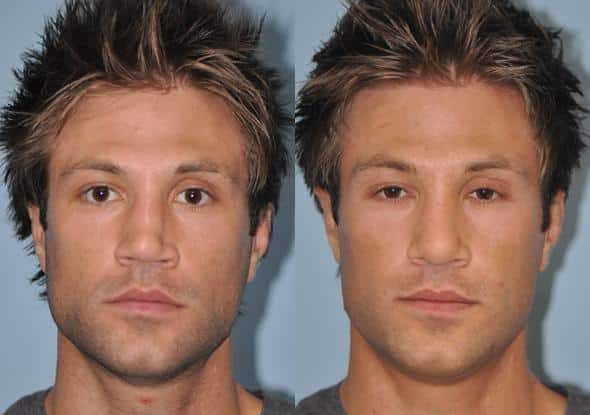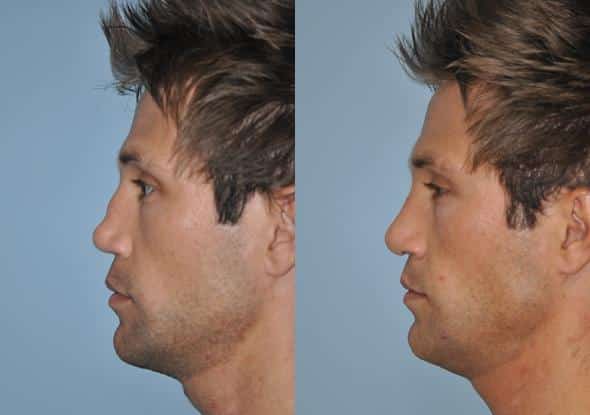Have you ever looked in the mirror after a nose job and wondered why your results don’t look as smooth as expected? For many patients, nasal indentations can be an unsettling surprise, leaving them questioning whether their healing process is normal or if something went wrong.
While rhinoplasty is one of the most popular cosmetic procedures, it can sometimes lead to irregularities such as small dents on the nasal bridge or nose tip. Understanding why these issues occur is the first step in addressing them and regaining confidence in your appearance.

Why is There a Dent in My Nose After Rhinoplasty?
Nasal dents after rhinoplasty can occur for several reasons, often related to changes in the nasal structure during surgery. A dent may appear on the nasal bridge, nose tip, or other areas due to tissue removal, cartilage reshaping, or the way the skin heals over the new structure. In most cases, these dents are minor irregularities that can be corrected, but they do require careful evaluation by a qualified surgeon to determine the best treatment approach.
Excessive Tissue Removal
One common reason for nasal indentations after rhinoplasty is excessive tissue removal. When a surgeon inadvertently removes too much bone or cartilage, it can create a scooped or depressed appearance on the nose bridge or tip. These changes may compromise the structural support of the nose, making the surface appear uneven or hollow. Correcting such issues often requires a revision procedure that restores lost volume and rebuilds the nasal framework.
Structural Weakness
When rhinoplasty alters the underlying bone and cartilage too aggressively, it can weaken the nasal structure and compromise long-term stability. This structural loss may cause parts of the nose to appear hollow or sunken, sometimes leading to a partial collapse around the nostrils or nasal tip. These changes not only affect aesthetics but may also influence breathing function. Correcting this type of weakness often involves grafting techniques that rebuild support and restore both form and function.
Healing Issues
Scar tissue development or unhealthy recovery habits can sometimes cause internal tension or thinning of the skin, leading to visible indentations. Factors such as alcohol consumption and smoking are known to degrade skin quality, making it more likely for the skin to collapse in certain areas. In some cases, improper healing can produce irregular scarring that pulls down on the nasal surface. Addressing these concerns often requires interventions that reduce scar tissue and improve overall skin health.
Suture Reactions
In some cases, a delayed inflammatory response to the internal sutures used during rhinoplasty can create noticeable indentations. As the body reacts to these sutures, localized swelling or tissue contraction may occur, pulling the skin inward and leaving a visible dent. These reactions are relatively uncommon but can still affect the final appearance of the nose. Treatment often involves monitoring the healing process, removing problematic sutures if necessary, or performing minor corrective procedures to smooth the nasal surface.
Improper Taping
If nose taping is performed incorrectly during recovery, it can put uneven pressure on the healing tissues and lead to the development of dents. Overly tight or misaligned tape may press into delicate areas of the nasal bridge or tip, creating unwanted indentations. Proper taping technique is essential to support the new structure without causing harm. Patients should always follow their surgeon’s specific instructions carefully and avoid making adjustments on their own to reduce the risk of these complications.
Revision Rhinoplasty Results


* Each patient is unique and individual results may vary.
Are There Any Risks or Complications From Having an Indented Nose?
Everyone’s idea of modern beauty is different, but for many patients, nasal indentations can cause self-consciousness about their rhinoplasty results. Even small irregularities in nasal appearance may become a daily reminder of dissatisfaction, leading to emotional stress or reduced confidence. This discomfort can affect how people feel in both social and professional situations.
Beyond the cosmetic side, indentations can sometimes contribute to functional problems. Weak points in the nose may interfere with proper airflow, leading to breathing difficulties or long-term irritation. While not always severe, these complications underscore the importance of careful evaluation and, in some cases, correction to restore both comfort and appearance.
How to Fix a Dent on the Nose After Rhinoplasty
Correcting nasal dents can involve both surgical and non-surgical options, depending on the severity and location of the issue. Some patients may require a revision rhinoplasty to restore structure, while others may benefit from less invasive treatments that add volume or smooth irregularities. Understanding the available approaches can help patients feel reassured that effective solutions exist.
Revision Rhinoplasty (Surgery)
For most patients experiencing nasal dents after a prior procedure, revision rhinoplasty is the most effective and lasting solution. This surgical intervention allows the surgeon to rebuild weakened areas, replace missing tissue, and correct both minor and major concerns. Because it can address problems created by previous surgeries, revision surgery offers a broader scope of correction than temporary treatments. While non-surgical methods can camouflage small irregularities, only revision rhinoplasty can permanently restore strength, balance, and aesthetics to the nose, making it the gold standard option for many patients.
Liquid Rhinoplasty (Fillers)
As a non-surgical treatment option, liquid rhinoplasty can temporarily correct nasal dents using dermal fillers. By carefully placing fillers into areas of depression, a surgeon can smooth out irregularities and improve overall symmetry. This approach is especially helpful for patients with minor indentations who are not ready for revision surgery. While results are immediate and can last several months to over a year, it is important to remember that this solution is not permanent. For individuals seeking a less invasive path, however, liquid rhinoplasty provides a safe and effective way to enhance nasal appearance.
Facial Fat Grafting
Another effective approach for correcting nasal dents is facial fat grafting. This method uses fat taken from another part of the patient’s body, which is then purified and carefully injected into areas of depression on the nose. Because the material is natural, it integrates smoothly with surrounding tissues and can offer long-lasting improvement. Fat grafting is particularly useful for patients who want a more permanent alternative to fillers but are not ready for a full surgical revision. When performed skillfully, it restores balance, smooths irregularities, and enhances overall nasal contour.
Custom Silicone Implants
Custom silicone implants offer another surgical option for correcting more pronounced or complex nasal dents. These implants are designed to fit the patient’s unique anatomy, adding structure and support where bone or cartilage is insufficient. Because they are custom-made, they provide precise correction and long-term stability. This approach is often reserved for cases where other techniques, such as fillers or fat grafting, may not provide adequate results. When performed by a skilled surgeon, silicone implants can restore contour, improve facial harmony, and deliver a durable solution to challenging nasal irregularities.

Don’t let an untreated dent or failed rhinoplasty define your confidence.
The longer you wait, the more scar tissue can develop—and the harder it becomes to fix. If your reflection feels like a daily reminder of something that went wrong, it doesn’t have to stay that way. You deserve to feel proud of your face again.
Let’s talk about how we can help you reclaim your confidence
Choosing the Right Facial Plastic Surgeon
When it comes to addressing nasal dents or irregularities after a nose job, the importance of choosing an experienced specialist cannot be overstated. Revision procedures demand a surgeon with extensive knowledge of nasal anatomy and reconstructive surgery to minimize risks and achieve natural, lasting results.
At The Naderi Center, you’ll find the most specialized team of experts in the United States. Dr. Shervin Naderi, our double board-certified rhinoplasty specialist, is renowned for his mastery of both the aesthetics and functional aspects of the nose. With his experience and artistry, patients can feel confident they are in the hands of the right surgeon. Call us today or visit our contact page to schedule your consultation.